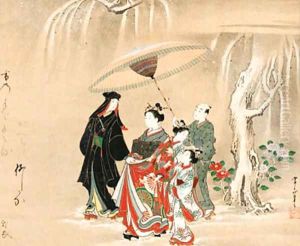Kawamata Tsunemasa Paintings
Tadashi Kawamata, born in 1953 in Hokkaido, Japan, is a contemporary artist known for his site-specific installations and public art projects that often take the form of temporary structures made from reclaimed materials. He studied at the Tokyo National University of Fine Arts and Music and later attended the Ecole des Beaux-Arts in Paris through an overseas study program for artists sponsored by the Japanese government.
Kawamata's work is characterized by his engagement with the environment and communities in which he operates. His art is not something to be merely looked at but interacted with and experienced. He often begins his projects with meticulous planning and model-making and involves local residents and stakeholders in the creation process. This participatory aspect of his work blurs the lines between artist, art, and audience.
Throughout the 1980s and 1990s, Kawamata gained international recognition for his interventions in urban and natural environments. His installations often appear as organic growths upon existing architecture or landscapes, reflecting a commentary on urbanization, poverty, and the transience of human endeavors. Notable projects include 'Project on Roosevelt Island' in New York, 'Favela Cafe' at the Venice Biennale, and 'Tree Huts' in various locations around the world.
Kawamata has served as a professor at various institutions and has been involved in numerous educational projects. He is also known for his role as an artistic director for art festivals and for his contributions to discussions on public art and architecture. As of my knowledge cutoff in 2023, Tadashi Kawamata continues to be an active figure in the contemporary art world, creating works that encourage viewers to reconsider their relationship with the built environment and the nature of community engagement in the creation of art.








